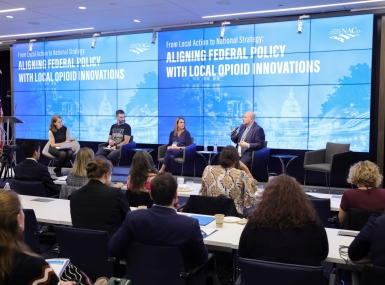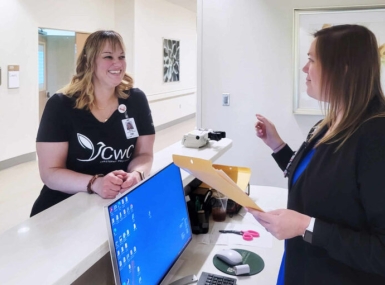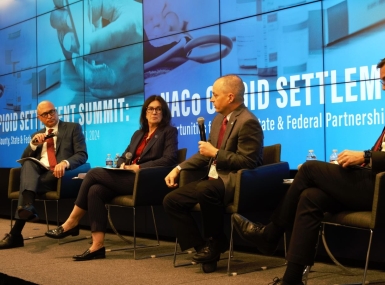Opioid Solutions Center

NACo's Opioid Solutions Center empowers local leaders to invest resources in effective prevention, treatment, recovery and harm reduction practices that save lives and address the underlying causes of substance use disorders.
Counties are on the frontline of the opioid epidemic, providing public services that save lives and support recovery. Our 911 call centers and county-run crisis lines are the first to receive calls for help when an overdose happens. Our first responders, and increasingly mental health clinicians, are the first to arrive on the scene to stabilize the crisis and offer support. Our local crisis triage centers serve as safe places before, during and after a behavioral health crisis to access services, treatment and immediate and ongoing care.
Funding from the national opioid settlements presents an opportunity for counties to sustain and strengthen our response to the ongoing opioid epidemic. To help counties maximize the impact of this unique funding stream, NACo provides custom planning, implementation and peer learning resources through the Opioid Solutions Center.
Strategy Briefs
The national opioid settlement agreements include parameters for how funds can be spent. To help counties assess and prioritize the various types of eligible expenditures, NACo identified a subset of approved strategies that are high impact and under county authority. For each strategy, NACo provides a summary of the evidence, considerations for implementation and county examples.
This content is intended for educational purposes only. The National Association of Counties (NACo) supports policies and programs that equip county governments with the resources and flexibility needed to serve our residents. NACo does not endorse any particular strategy or approach shared in this resource over another. For official NACo positions, please refer to the American County Platform.

Pretrial Services for People with Opioid Use Disorder
Pretrial services typically consist of assessments and decisions concerning bail, release and community supervision in anticipation of future court appearances. These processes provide important opportunities to engage local health care and social services providers and link defendants and their families to the care that they need.

Coordination of Care Upon Release From Incarceration: A NACo Opioid Solutions Strategy Brief
Coordination of care upon release is the deliberate organization and sharing of information between correctional and community-based service providers to ensure the most effective care for each person returning to the community.

Pre-Arrest Diversion: A NACo Opioid Solutions Strategy Brief
Pre-arrest diversion strategies enable law enforcement officers to refer community members with unmet needs to trauma-informed case management and support services in lieu of arrest, prosecution and incarceration.

Comprehensive Services for People With Co-Occurring Disorders: A NACo Opioid Solutions Strategy Brief
Comprehensive services integrate multiple forms of substance use, mental health and case management services and may include: evidence-based treatments for SUD, integrated mental health treatment services, housing support, transportation support, employment and educational services, income support, social support, legal services and child care.

Linkage to Care Across County Systems: A NACo Opioid Solutions Strategy Brief
As the owners and operators of systems of service that regularly interface with people affected by substance use such as hospitals, jails, courts and community colleges, counties are well positioned to link community members with evidence-based options for care, especially medications for opioid use disorder (MOUD).

Warm Hand-Offs: A NACo Opioid Solutions Strategy Brief
A warm hand-off is a form of referral to treatment or other services. A typical referral gives someone information about how to reach the services they need but may leave them to contact those services on their own. In contrast, a warm hand-off is a transfer of care between service providers through face-to-face, phone or video interaction in the presence of the person being helped.

Youth-Focused Prevention: A NACo Opioid Solutions Strategy Brief
Youth-focused programs, including school-based programs, may help support young people and their families, strengthen community connections and mitigate the long-term negative impacts of adverse childhood experiences.

Medication-Assisted Treatment (“MAT”) for Opioid Use Disorder: A NACo Opioid Solutions Strategy Brief
The Food and Drug Administration (FDA) has approved three medications that safely and effectively treat opioid use disorder (OUD) to improve the health and wellbeing of people living with OUD. MAT is defined by on-going, long-term treatment with one of these three medications.

Syringe Services Programs: A NACo Opioid Solutions Strategy Brief
Syringe services programs (SSPs) provide low-barrier access to sterile supplies for safer substance use, naloxone and overdose prevention tools like fentanyl test strips and drug checking services. SSPs also provide a range of other services, such as options for safe syringe disposal, overdose recognition and response training and help accessing services for HIV, substance use disorders and more.

Effective Treatment for Opioid Use Disorder for Incarcerated Populations: A NACo Opioid Solutions Strategy Brief
Medication-assisted treatment (MAT) is considered the “gold standard” of care for opioid use disorder (OUD). Because incarceration is a known driver of opioid overdose, failure to provide this gold standard of care to incarcerated individuals may exacerbate health risks in your community.

Treatment and Recovery for Pregnant and Parenting People: A NACo Opioid Solutions Strategy Brief
Effective treatment for pregnant and parenting people means expanding access to MOUD and adopting a family-centered approach that prioritizes keeping families together.

Naloxone to Reverse Opioid Overdose
Naloxone is a “rescue” drug that quickly and safely reverses opioid overdose. It is available as an injectable solution and as a nasal spray. Naloxone works by blocking the effects of opioids in the body. Virtually all opioid overdose deaths are preventable if naloxone is administered in time.

Post-Overdose Response Teams
Post-overdose response teams (also called quick response teams or post-overdose outreach programs) conduct outreach and offer services to people who have experienced an overdose within about 72 hours of the overdose event.

Treatment for Neonatal Abstinence Syndrome: A NACo Opioid Solutions Strategy Brief
Neonatal Abstinence Syndrome or NAS (also called Neonatal Opioid Withdrawal Syndrome or NOWS) is a condition that sometimes affects newborns of parents who have taken opioids during pregnancy. Because NAS does not cause long-term health consequences, treatment with MOUD – as opposed to withdrawal and abstinence – is safer for both parents and their infants.

Increasing Access to Evidence-Based Treatment: A NACo Opioid Solutions Strategy Brief
Our health care system’s capacity to provide medications for opioid use disorder (MOUD) falls far below the current demand for care. Only 1 in 4 people who need MOUD are able to access them. A multi-pronged approach is needed to build up the treatment workforce, create effective pathways to care and save lives.
Planning Principles
The Principles for the Use of Funds From the Opioid Litigation are nationally recognized guidance for states, counties and cities receiving opioid settlement funds. The Principles encourage governments to 1) spend the money to save lives, 2) use evidence to guide spending, 3) invest in youth prevention, 4) focus on racial equity and 5) develop a fair and transparent process for deciding how to spend the funding. The resources below serve as a quick reference to help counties operationalize the Principles in our administration of opioid settlement funds.

The Principles Quick Guide on Transparency for Opioid Settlement Fund Management
The Principles for the Use of Funds From the Opioid Litigation are nationally recognized guidance for states, counties and cities receiving money from the lawsuits against entities that contributed to the opioid epidemic. These planning Principles, coordinated by faculty at the Johns Hopkins Bloomberg School of Public Health, can help jurisdictions create a foundation for effective spending of the monies to save lives from overdose.

The Principles Quick Guide to Monitoring Opioid Settlement Spending
The Principles for the Use of Funds From the Opioid Litigation are nationally recognized guidance for states, counties, and cities receiving money from the lawsuits against entities that contributed to the opioid epidemic.

The Principles Quick Guide to Removing Policy Barriers
After decades of research into effective interventions for opioid use disorder, there are now many evidence-based solutions to the prevention, treatment, recovery, and reduction of harms associated with opioid use. For an evidence-based program to produce the intended results, it may first be necessary to remove laws and regulations that interfere with proper implementation of the program. By conducting a policy review, county leaders can proactively identify and amend policies that may otherwise limit the impact of opioid settlement investments.

The Principles Quick Guide to Creating a Settlement Council
The Principles for the Use of Funds From the Opioid Litigation are nationally recognized guidance for states, counties and cities receiving money from the lawsuits against entities that contributed to the opioid epidemic.

The Principles Quick Guide to Conducting a Needs Assessment
The Principles for the Use of Funds From the Opioid Litigation are nationally recognized guidance for states, counties and cities receiving money from the lawsuits against entities that contributed to the opioid epidemic.
Case Studies

Promising Practices for Collaboration on State and Local Opioid Settlement Spending
Between 2022 and 2040, states, counties and cities expect to receive over $50 billion in payments from the national opioid settlements. As settlement payments are disbursed in the coming years, continued state-local coordination is key to ensuring that these resources are effectively invested.

Five Questions for Counties Considering Harm Reduction as an Opioid Abatement Strategy
For America’s counties, harm reduction complements prevention, treatment and recovery services to create a more holistic and effective system of care.

Advancing Health Equity Through County Opioid Abatement Strategies
To support counties with utilizing opioid settlement funds to advance health equity, NACo developed case studies on five counties that are integrating opioid settlement funds into ongoing health equity initiatives. This resource details steps taken by these counties during the first year of opioid settlement payments and considerations for counties in other jurisdictions.
FEATURED INITIATIVE
Opioid Solutions Leadership Network
NACo’s Opioid Solutions Leadership Network is a learning community for county leaders who are committed to investing opioid settlement funds to save lives and address the needs of people affected by substance misuse.

Featured News

Proposed federal mandates cloud opioid treatment
Counties are positioned to quickly feel the effects of Office of National Drug Control Policy’s new priorities.
King County school offers students a route to sobriety
The Interagency Recovery Campus, funded in part by King County, Wash. Behavioral Health and Recovery, fosters an environment to support students' paths to sobriety.

Urban opioid education moves to rural counties
A hospital program in Fulton County, Ga. that educates patients on opioids, and is working to prevent misuse and dependency at the source, is expanding to four rural counties in Georgia.

Opioid fight gets resources, faces pitfalls after settlement
Counties are receiving a sizable amount of money from the national opioids settlement, but the needs generated by the crisis continue to grow.

Family response is key to treating opioid disorders
Milwaukee County, Wis. is taking steps to make sure those resources are as close to the people who need them as possible, including strategic placing of harm-reduction vending machines in historically underinvested neighborhoods.

County Officials Discuss Harm Reduction as a Path Forward through the Overdose Epidemic
At NACo’s 2023 Legislative Conference, county officials discussed harm reduction as a path forward through the opioid epidemic. Three participants in NACo’s Opioid Solutions Leadership Network served as panelists at the workshop.

Counties Form National Network of Opioid Settlement Decision Makers
30 counties selected to represent county excellence in opioid settlement implementation
Call to Action: Stay Up-to-Date
Complete the form to sign up for emails with the latest news and resources from the NACo Opioid Solutions Center.